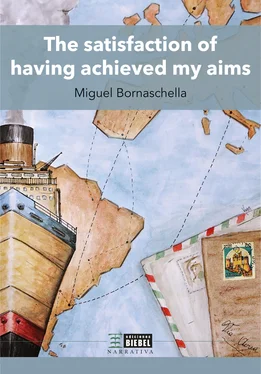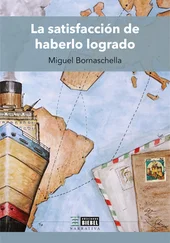There was no unemployment in Montaquila. Everybody had something to do at all times, every time. And there was always something else to do. In Montaquila there were not and there are not any industries. Most of the things and almost everything was produced and came from the ground and from the animals. The valley crossed by the Volturno River was the most productive land, the most fertile. Everybody had, including my family, their own small pieces of land along the river, and with a bit of quick-thinking and another bit of intelligence people made it quite productive. Whatever was got from the ground was simply and kindly sold or bought among the neighbours. Things were exchanged among them and if there were any which were not, they were carried to nearby towns to be commercialized with different fortune. The value of each thing had been fixed since remote generations, by some unknown and invisible decision, but nobody dared to discuss or argue about it, and nobody thought that it would be necessary to change these regulations: one thing of something was worth two of another thing and thus, all the things had a price, and were quietly commercialized. Money was limited so it was kept in small quantities just for certain important occasions, and even the doctor was paid for with a basket of vegetables or with other things or services, consequently money was not used. Wheat was grown and the harvest was taken to the mill. Part of it was left there as payment for the flour that was taken home. Whatever somebody lacked, somebody else had. In this way everybody had the necessary goods. Eventually the labours were exchanged whenever someone happened to go and work in somebody else’s field. And everything was done under an ordinary state of order and brotherhood and if any argument arose, it did not last long because the judge acted immediately and the dispute came to an end.
During a whole year the families bred their pig to get the meat. Then it was chopped into small portions, kept in big vessels made of stone called “pila” covered with fat, in the rooms that every house had and was assigned to keep the goods and preserves, till the following year. Among other things dry tomatoes were stored or tomato sauce already processed was kept in bottles after the ritual of the harvest. This ceremony was a kind of party in the town in which all the neighbours gathered and helped each other to process their own production, and thus obtaining the corresponding exchange of labours. All the members of the family would participate and it was one of the entertainments of those days. Not only were the tomatoes processed, but also the wheat and the maize were peeled and the vegetables picked up and gathered. When the job was finished some neighbours played some music and others danced. My father used to take part of this and all the other different tasks quite lively. He was a very hard worker, tireless but also well-known in town for his ability at playing the accordion with eight keys. My mother did not use to celebrate this ability of his. Once when she was pregnant, the scenery to play his musical instrument had become a bit complicated. My father and his friends thought they had been original when they decided to play a kind of comedy in which some neighbours came to fetch him, he rejected the invitation but they would finally persuade him. The comedy was developed late in the evening with some of them speaking and shouting from the street while my father was replying from the inside, they were obviously exchanging lies. My mother let them act for a while until her patience was over, then she gave him permission to go with them making him believe, as she usually did, that he had finally convinced her… But the night was long and my father did not arrive home. The time for permission had finished and my mother went for him, imagining without any mistakes what was happening: the famous phrase “the one who plays, does not dance”, was not carried out on this occasion. In fact the accordion, my mother and my father came back home very quickly. And the accordion was not played outside of our home for a long time.
With the fruit grown and collected, with the animals bred and sacrificed, with the exchange of goods and the labour of manufacturing, with the ability to ration and administer what people had, everybody ate well. The distribution that my mother used to do at lunch time and at dinner had the same fairness as the one used by people in the town when they exchanged their goods. At home the proportion of food eaten was according to quantity of work done. Nobody would dare to argue about this distribution, because the only one who did not receive the right share was my Mum, Filomena… The consequences of that diet could be seen in her very small and scraggy body, though she was always quite healthy. Only because of the logical damage that age causes had I seen her ill or in bed, not even taking a rest or had I heard her groaning. I had never seen or heard her complaining or boasting of taking the decisions at home or of doing any kind of job, neither in Italy nor in Argentina. She never fell ill in bed because she herself had decided not to do so. The idea of getting sick or ill was like stopping the cog-wheel of a clock. The colds, the influenza and the aches in her bones did not affect her. In fact she suffered from all those things like everybody else, but she did not get sick or ill. She went on doing her duties without complaints. During the last stage of her life she used to say that people saw her very well, and flattered her: “Yes, of course you have always seen me well”, she used to say, “but the fact is that I have never complained because my complaints would not have changed anything. It’s no use…”.
She worked as much as my father did. Very early in the morning she milked the cow and later prepared the curd and the cheese. She prepared breakfast for her children, passed my milk from one cup to another to cool it and then sent my brother and sisters to school. Another ordinary task done daily by her was going to the fountain, she carried a tub made of copper and walked three hundred meters to put some water in it. The water was brought from the highest part of the mountain flowing through tubes to get to the center of the town.
During the winter meanwhile the melting was very slow and gradual the water flowed and hardly came out from the faucet at the end of the tube, this made the activity of the town become more slowly. Because of this there were long queues full of patience, there were also exceptions… From a positive point of view a social approach was created, this included a convenient excuse when the young ladies gave some hope to the young men and this sometimes ended up into an engagement. But not all the relationships were so friendly. There were few families who could pay for having all this work of carrying the water done by someone else. The problems did not last long to arise from time to time when any of the vessels suddenly turned up before others without any rights of their owners, then some violent arguments and brawls started and some vessels were kicked and battered. Finally my Mum came back home with twenty litres of clear water in the vat. She carried it on her head. She put a piece of cloth on her head as if it were a crown. Mum was not out of these kinds of quarrels and her vat also had the corresponding beats. She had an unmatched skill and perfect balance not to lose a single drop of water. When water arrived home we all used it to cook or to wash ourselves.
The clothes were washed in the river with the soap which, as it could not be different, was also made by my mother by cooking the fat of the pork and some caustic soda. The routine went on with the preparation of food at lunch time which she later carried to the piece of land where my father was working. While he was having lunch, she went on with the labours in the field and when he finished his lunch she still went on working. She came back home to prepare dinner, waited for my father, and eventually got ready, just in case, to carry out the compromises of marriage, which could not be rejected – as she used to tell my daughter, Lorena, many years later. Not even of any of these tasks did she ever complain. Her nature, her spirit was to make sacrifice naturally and in so many other respects, assimilate this sacrifice without blaming or making any recriminations for her fate.
Читать дальше












